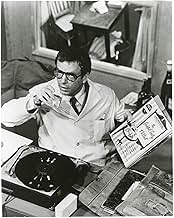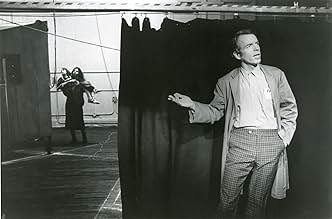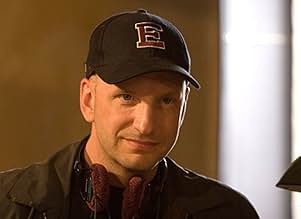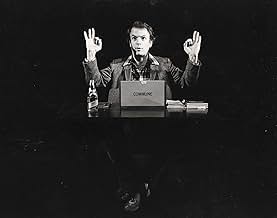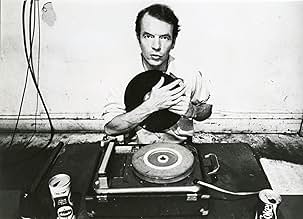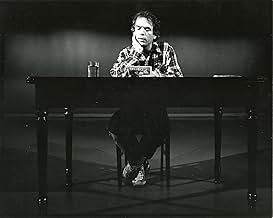NOTE IMDb
7,1/10
1,3 k
MA NOTE
Ajouter une intrigue dans votre langueA look at the art of Spalding Gray who drew from real life experience to create a compelling and deeply personal series of monologues.A look at the art of Spalding Gray who drew from real life experience to create a compelling and deeply personal series of monologues.A look at the art of Spalding Gray who drew from real life experience to create a compelling and deeply personal series of monologues.
- Réalisation
- Casting principal
- Récompenses
- 1 nomination au total
Forrest Gray
- Self
- (images d'archives)
- (non crédité)
Kathie Russo
- Self
- (images d'archives)
- (non crédité)
Histoire
Le saviez-vous
- AnecdotesThis film is part of the Criterion Collection, spine #617.
- ConnexionsFeatures Spalding Gray: A Life in Progress (1988)
- Bandes originalesTubthumping
Written by Danbert Nobacon, Dunstan Bruce, Alice Nutter, Louise Watts, Paul Greco, Darren Hammer, Allen Whalley and Judith Abbott
Performed by Chumbawamba
Commentaire à la une
Just watched this and must say it is totally brilliant.
Soderbergh has brought us SPALDING GRAY'S FINAL MONOLOGUE with the film, "And Everything Is Going Fine".
He compiles what is essentially a final autobiographical testament of Gray's life using rare footage of his TV interviews, recordings of his theatrical monologues, and even some footage taken personally by Gray with his family members.
A simple mash-up of such footage gives Gray the oppourtunity to bring us one final monologue- from the grave- speaking about himself, just as he loved to do...for our pleasure, and his sanity!!! He truly was the best monologist, one-man-show and storyteller to ever grace the stage.
And Soderbergh- whom directed Gray's Anatomy (Gray's 1996 monologue,which is beautifully shot) and King of the Hill (in which Gray played the role of Mr. Mungo)- must get props for not succumbing to the urge of telling Gray's story, but instead appropriately allowing Gray to tell it himself. Collaborating through selectivity and editing, Soderbergh plays a role much like the one he did when filming his earlier monologue.
Gray begins this story by discussing the overwhelming influence his mother had on him...an influence that would consume and eventually take his life. He continues by talking about his journey to Hollywood, becoming an actor, his various escapades, his travels to India, the art of writing and performing monologues, the art of acting, the value of conversing with the audience and people off the street, his marriage, keeping secrets, and ending with a recollection of his experience of being in a major accident, one he would never fully recover from.
Throughout this monologue he reflects upon life, living, death, growing up, sex, love, relationships, experience, creative narcissism, psychology and the limitations of being human, hardship, depression, and, most importantly, introspection.
On January 10, 2004, after watching the film "Big Fish" Spalding Gray got on the Staten Island Ferry from which he would jump, committing suicide, as his mother did before him. Gray killed himself as a result of the major depression that plagued him after the accident he discusses near the end of the film. I have included this information here, but Soderbergh decided to omit it from the film. He does this so we can remember him for what he did in life, as opposed to how he exited in death. (and because Gray can't tell us the story of his death from the beyond...if only...)
This can be contrasted with the film "Lenny Bruce - Without Tears" in which Fred Baker decided to not only discuss Bruce's tragic death, but show the photos and video footage of Bruce lying dead naked on his bathroom floor with a needle in his arm. I do not hold this against Soderbergh, because I feel that this final testament is true to how "Spud" would want to be remembered. He was always one to create his own myth (as opposed to Bruce who "kept it real"), and it was only appropriate for Soderbergh to let Gray tell his own story.
Shortly after the middle of the film there are a couple interviews in which Gray foreshadows his own tragic death. It is clear from the footage at the end of the film- after the accident- that he never was able to fully recover from the crash- emotionally or physically- and that is what drove him to join his Mother, in death.
May you RIP Spalding, you will never be forgotten! I'm sure you are ecstatic that Soderbergh gave you the chance to bring us one last monologue- your final testament to the world - at least i hope you are. Thank you for everything you've done to entertain us, I hope you gained as much from it as we did.
A definite 10 out of 10, if you loved Spalding Gray as much as I do, you will not want to miss this!!!
Soderbergh has brought us SPALDING GRAY'S FINAL MONOLOGUE with the film, "And Everything Is Going Fine".
He compiles what is essentially a final autobiographical testament of Gray's life using rare footage of his TV interviews, recordings of his theatrical monologues, and even some footage taken personally by Gray with his family members.
A simple mash-up of such footage gives Gray the oppourtunity to bring us one final monologue- from the grave- speaking about himself, just as he loved to do...for our pleasure, and his sanity!!! He truly was the best monologist, one-man-show and storyteller to ever grace the stage.
And Soderbergh- whom directed Gray's Anatomy (Gray's 1996 monologue,which is beautifully shot) and King of the Hill (in which Gray played the role of Mr. Mungo)- must get props for not succumbing to the urge of telling Gray's story, but instead appropriately allowing Gray to tell it himself. Collaborating through selectivity and editing, Soderbergh plays a role much like the one he did when filming his earlier monologue.
Gray begins this story by discussing the overwhelming influence his mother had on him...an influence that would consume and eventually take his life. He continues by talking about his journey to Hollywood, becoming an actor, his various escapades, his travels to India, the art of writing and performing monologues, the art of acting, the value of conversing with the audience and people off the street, his marriage, keeping secrets, and ending with a recollection of his experience of being in a major accident, one he would never fully recover from.
Throughout this monologue he reflects upon life, living, death, growing up, sex, love, relationships, experience, creative narcissism, psychology and the limitations of being human, hardship, depression, and, most importantly, introspection.
On January 10, 2004, after watching the film "Big Fish" Spalding Gray got on the Staten Island Ferry from which he would jump, committing suicide, as his mother did before him. Gray killed himself as a result of the major depression that plagued him after the accident he discusses near the end of the film. I have included this information here, but Soderbergh decided to omit it from the film. He does this so we can remember him for what he did in life, as opposed to how he exited in death. (and because Gray can't tell us the story of his death from the beyond...if only...)
This can be contrasted with the film "Lenny Bruce - Without Tears" in which Fred Baker decided to not only discuss Bruce's tragic death, but show the photos and video footage of Bruce lying dead naked on his bathroom floor with a needle in his arm. I do not hold this against Soderbergh, because I feel that this final testament is true to how "Spud" would want to be remembered. He was always one to create his own myth (as opposed to Bruce who "kept it real"), and it was only appropriate for Soderbergh to let Gray tell his own story.
Shortly after the middle of the film there are a couple interviews in which Gray foreshadows his own tragic death. It is clear from the footage at the end of the film- after the accident- that he never was able to fully recover from the crash- emotionally or physically- and that is what drove him to join his Mother, in death.
May you RIP Spalding, you will never be forgotten! I'm sure you are ecstatic that Soderbergh gave you the chance to bring us one last monologue- your final testament to the world - at least i hope you are. Thank you for everything you've done to entertain us, I hope you gained as much from it as we did.
A definite 10 out of 10, if you loved Spalding Gray as much as I do, you will not want to miss this!!!
- meddlecore
- 27 déc. 2010
- Permalien
Meilleurs choix
Connectez-vous pour évaluer et suivre la liste de favoris afin de recevoir des recommandations personnalisées
- How long is And Everything Is Going Fine?Alimenté par Alexa
Détails
- Date de sortie
- Pays d’origine
- Site officiel
- Langue
- Aussi connu sous le nom de
- Untitled Spalding Gray Project
- Société de production
- Voir plus de crédits d'entreprise sur IMDbPro
Box-office
- Montant brut aux États-Unis et au Canada
- 22 080 $US
- Week-end de sortie aux États-Unis et au Canada
- 7 035 $US
- 12 déc. 2010
- Montant brut mondial
- 22 080 $US
- Durée1 heure 29 minutes
- Couleur
- Rapport de forme
- 1.33 : 1
Contribuer à cette page
Suggérer une modification ou ajouter du contenu manquant

Lacune principale
By what name was And Everything Is Going Fine (2010) officially released in Canada in English?
Répondre

